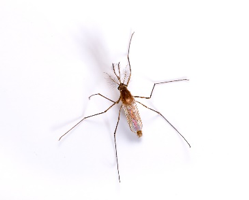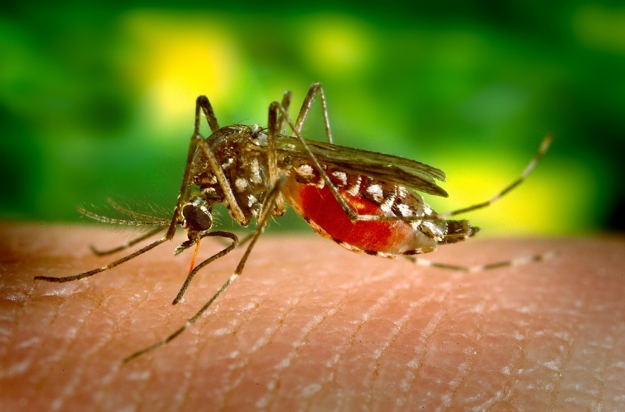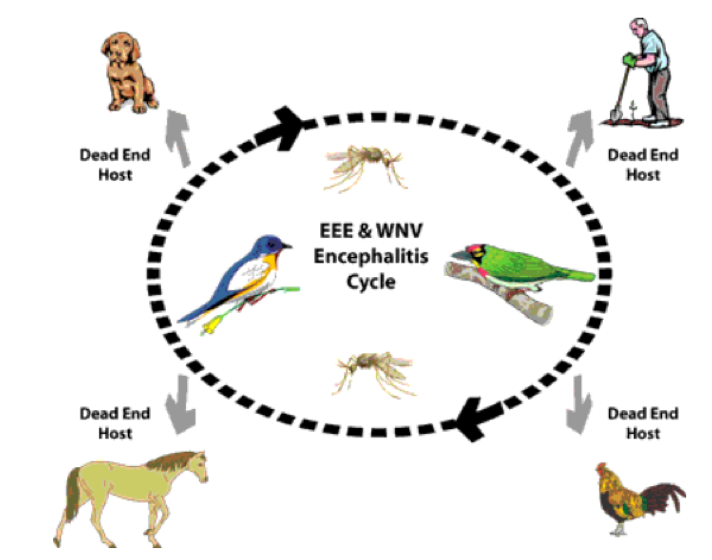 Mosquitoes are a type of fly that belong to the insect family Culex. The females have the piercing and sucking mouthparts that are necessary to allow them to feed on human and animal blood, which allows them to nourish their eggs. The male of the species does not bite and can even be beneficial in helping to pollinate some flowers. Mosquito bodies and wings are covered in tiny scales. Adult sizes may range from 3-9 mm.
Mosquitoes are a type of fly that belong to the insect family Culex. The females have the piercing and sucking mouthparts that are necessary to allow them to feed on human and animal blood, which allows them to nourish their eggs. The male of the species does not bite and can even be beneficial in helping to pollinate some flowers. Mosquito bodies and wings are covered in tiny scales. Adult sizes may range from 3-9 mm.
Mosquitoes take approximately one week to develop from egg to the flying adult. After emerging from the aquatic stages, adult mosquitoes mate and the females seek a blood meal to obtain nutrients necessary for egg development. Only the female adult bites, while both sexes utilize sugar sources for general nutrient requirements. In Florida, mosquitoes are a year-round problem for residents. While mosquito populations increase during the peak of summer heat, temperatures don’t get quite cold enough during the year to eliminate all mosquitoes. Hurricane season also brings more mosquito breeding due to their attraction to standing water left in the aftermath of inevitably frequent downpours.
Why are there mosquitoes in my yard?

Mosquitoes breed in still water, even as small as water gathered in a plastic soda bottle cap. The heavy rains we experience in Florida make it easy for mosquitoes to breed without diligent dumping of collected water or professional pest control. Rain water can gather around your property within tires, downspouts, bird baths, children’s play equipment, buckets, clogged gutters, and flowerpots. Even if you dump water from all of the areas listed above, a next door neighbor who isn’t as proactive can cause mosquitoes to wander into your yard. Properties that back up to rivers and creeks are especially susceptible to heavy mosquito activity.
Are mosquitoes dangerous?
Mosquitoes carry several diseases that can be transmitted to humans.

Pictured Above: Lifecycle of EEE and West Nile Virus Photo Credit: Leon County
Both EEE and West Nile Virus are spread from an infected bird to a mosquito that feeds upon it. The newly infected mosquito then feeds on another bird, spreading the virus as the cycle continues. Hosts such as dogs, horses, chickens, and humans contract the virus from infected mosquitoes, but do not spread the virus. This is why they are considered “dead end hosts.”
-
- St. Louis Encephalitis (SLE)– First identified in St. Louis in 1933. Only a small portion of those infected by SLE exhibit symptoms and become ill. Severe cases progress from meningitis and encephalitis to coma and possible death.
- West Nile Virus– First identified in Florida and Leon County in July 2001. Most people do not feel and symptoms. Severe and rare cases cause brain inflammation or meningitis, and sometimes death.
- Zika Virus– First identified in Florida in 1959. Common symptoms last several days to a week, including fever, rash, headache, conjunctivitis, muscle pain, and joint pain.
- Eastern Equine Encephalitis (EEE)– First identified in the 1930’s. Severe cases can result in seizures, coma, permanent brain damage, or even death.
How can I prevent mosquitoes at my house?
The best way you can prevent mosquitoes is to eliminate potential breeding points.
-
-
- Eliminate areas of standing water around the home, such as flowerpots, birdbaths, and baby pools. Mosquitoes only need about ½ inch of water to breed
- Throw away or store any containers that can accumulate water. Flip them upside down when not in use.
- Clean gutters frequently. Debris can clog and prevent water flow, causing gutters to fill up with standing water.
- Screen all windows and doors, repairing even the smallest holes that could serve as entry points for pests.
- Minimize outside activity between dusk and dawn, when mosquitoes are most active and wear long pants, long-sleeved shirts, and closed-toe shoes to protect the skin.
-
What is DEET?
DEET is a repellent that was developed by the U.S. Army in 1946 for the protection of soldiers in insect-infested areas and became approved for use by the general public in 1957. It’s primarily used in products that are applied directly to the skin or on clothing to repel mosquitoes and ticks in the form of lotions, sprays, roll-ons, and bracelets.
It’s important to know that DEET does not kill mosquitoes and ticks. DEET repels these pests that approach you by creating an invisible barrier around the areas where the product has been applied, making you undetectable to mosquitoes and ticks. Products that contain DEET display the amount of the ingredient by percentage. It’s important to note that higher percentages do not indicate a higher strength of DEET. The amount of DEET within a product dictates how long it will last once applied. For example, a product with 25% DEET will last several hours. However a product containing 4% DEET will last a much shorter length of time. When applying DEET, it’s important that you follow the instructions to remain safe. Although studies have proven that DEET is safe and effective, it isn’t always the best option for everyone. It’s important that you thoroughly research the options yourself or speak with your doctor to make an informed decision.
What Are Mosquitoes Termite and Pest Control in Tallahassee FL?
Serving Your Pest Needs for over 50 years in Tallahassee FL
